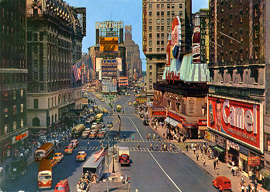
May 26, 2011

Times Square circa 1950
In that wonderful old Broadway musical Guys and Dolls, gambler Sky Masterson is romancing the Salvation Army’s Sister Sarah Brown after an all-nighter of boozing it up in Havana. Walking Sarah home to her mission in New York, he tells her that “Only in Times Square does the dawn get turned on by an electrician.” She swoons. Those were the good old days, when Runyonesque characters such as Nathan Detroit, Nicely-Nicely, Harry the Horse, Big Jule from Chicago, and Liver Lips Louis ruled Broadway. In that magical make-believe world, Nathan married Miss Adelaide (after a 14-year-engagement) and Sky got hitched to Sarah. The play had a very happy ending, although if there is a revival anytime soon, Nathan will most likely marry Sky and Miss Adelaide will wed Sister Sarah. (The clapped-out New York Times last Sunday had a long story about a transgender’s sex life and an editorial by a gay man encouraging a gay boycott of straight marriages. No wonder The Wall Street Journal is wiping the floor with the old bag. Saturation coverage of queenly matters).
Many people my age wish they had lived in another era, and I often get lost in pipe dreams of times past, but New York does this to me more than any other city because the place has changed so radically. Whites are now in the minority, cops are no longer polite or Irish, men don’t wear suits and hats anymore, and Times Square’s perfect combination of seediness and glamour has been lost forever to a blur of moving electrical surfaces advertising junk. Worse, the Sky Mastersons and Nathan Detroits have been pushed aside by dusky drug dealers, pimps, and marauding groups of young black toughs who appear out of nowhere and help themselves to any available goods. Back in the early 1950s Times Square was a young man’s paradise. One could see risqué foreign movies, pick up riskier women, and even flash a phony draft card to get served. The East Side was reserved for gaudy, exclusive “supper clubs,” places such as El Morocco and the Stork Club, where unsophisticated youth had no chance. In Times Square, things evened themselves out.